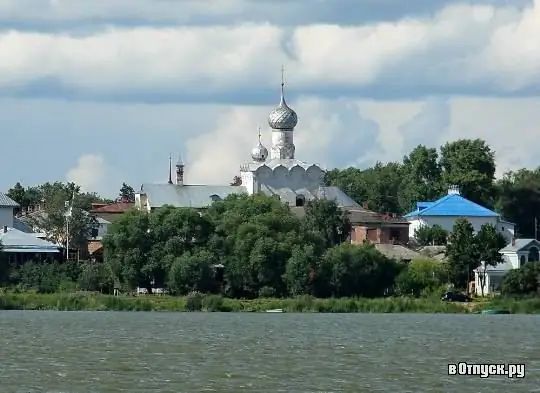
Description of the attraction
One of the most remarkable churches in the city of Rostov is the Nativity Cathedral, located on Sovetskaya Square. Information has reached our time that the temple was rebuilt several times. Unfortunately, contemporaries will never be able to see the bell tower related to the temple, because it was lost.
In the middle of 1715, the Nativity Cathedral, operating at the Rozhdestvensky Monastery, was decorated with fresco painting. A wall chronicle located on the slope of the portal on the western wall has survived to this day. Judging by these chronicles, the painting of the cathedral was carried out by "the diligence and diligence of Mother Superior Natalia." The names of the masters who worked on the painting of the cathedral are still unknown. It is important to note that the features of the style in which the painting was carried out are characterized by an indescribable saturation and even a slightly variegated color scheme, a multi-layered and lively language of narration, a wealth of patterned floral ornaments, a passion for beautiful patterns when decorating the wings, as well as utensils - all this allows us to count this painting is for the best works of the style of the Peter the Great, which is especially characteristic of Yaroslavl. At the end of 1873, in the Nativity Cathedral, when Mother Superior Maria was the abbess, the painting was carried out, the funds for which were allocated from Rulev Ivan Alekseevich.
As for the iconography of the central church, it is also true to the Yaroslavl traditions. Since the temple is small in size, the inherent closed vault is divided by means of cut-outs into several parts, on which the plots are written: "Resurrection", "New Testament Trinity", "Ascension" and "Descent of the Holy Spirit". All the available images of the Evangelists are very competently transferred to the upper slopes of window openings, which are located on the wall from the west. The wall surfaces are subdivided into five tiers, in the uppermost of which the earthly life of Jesus Christ is very briefly depicted. The next two tiers are dedicated to the theme of the Akathist of the Most Holy Theotokos. It is important to note that, judging by the completeness of the performance, this akathist cycle is the best in terms of iconographic versions, as well as the Yaroslavl school. The two lowest rows are especially vividly written, because they tell about the Passion of Christ. Next to the cathedral iconostasis, the cycle of Passions is depicted, which is complemented by several scenes from the life of the Most Holy Theotokos: Conception, Nativity, and Ascension.
The portal architectonics of the window openings of the temple is revealed somewhat indistinctly and not in all places to the same extent. Some window openings contain full-length figures of saints, while others depict seals that continue the plot.
Three entrance portals are very wide and connect the central space of the temple with the refectory; at the same time they are adorned with figures of martyrs and reverend saints. The main portal, including the angels guarding the entrance to the cathedral, depicts the Monks Isaac of Dalmatia and Stephen, who were considered the patrons of the city of St. Petersburg, the new Russian capital. On the side of the southern portal are depicted the Rostov miracle workers - the Horde Peter, Blessed Joseph, Abraham, who receives a rod from the hands of John the Theologian. The most recent image is written in spatial text, and it was chosen from the ancient life of Abraham.
As for the altar painting, here Yaroslavl artists are completely faithful to the traditions of classical iconography depicted in the temple of Iona Sysoevich. At the very end of the main altar is depicted "In joy of you", in the deaconist - "Seven Sacraments", "Praise of the Most Holy Theotokos", and in the altar - "Lamb in the chalice." On the altar wall, located on the west side, there is a large composition called "May God", while in the space between the portals are depicted the "Washing of feet" and "The Last Supper".
In the middle of 1874, the Nativity Cathedral was decorated with oil paint in the locations of the refectory room and the Trinity side-chapel. This mural is of great value, despite the fact that it was done in the traditional manner for that time.






